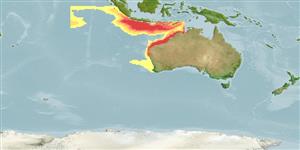Common names from other countries
Elasmobranchii (sharks and rays) >
Carcharhiniformes (Ground sharks) >
Carcharhinidae (Requiem sharks)
Etymology: Glyphis: Tautonymous with Carcharias glyphis Müller & Henle 1839. (See ETYFish); garricki: In honor of New Zealand ichthyologist John Andrew Frank (Jack) Garrick (1928-2018), for his revisions of the requiem shark family, and “who discovered this species in the form of two newborn males from Papua New Guinea and supplied radiographs, morphometrics, drawings and other details of these specimens (since lost) to the senior author”. (See ETYFish).
More on authors: Compagno, White & Last.
Environment: milieu / climate zone / depth range / distribution range
Ecology
Marine; brackish; pelagic-oceanic; depth range ? - 11 m (Ref. 76952). Tropical
Indo-West Pacific: Australia (salinities 6-26 and 32-36.6) and New Guinea.
Size / Weight / Age
Maturity: Lm ? range ? - ? cm
Max length : 145 cm TL male/unsexed; (Ref. 76952); 251.0 cm TL (female)
Life cycle and mating behavior
Maturities | Reproduction | Spawnings | Egg(s) | Fecundities | Larvae
Compagno, L.J.V., W.T. White and P.R. Last, 2008. Glyphis garricki sp. nov., a new species of river shark (Carcharhiniformes: Carcharhinidae) from northern Australia and Papua New Guinea, with a redescription of Glyphis glyphis (Müller & Henle, 1839). In Last, P.R., White, W.T. & Pogonoski, J.J. (eds.): Descriptions of New Australian Chondrichthyans. CSIRO Marine and Atmospheric Research Paper no. 22. (Ref. 76952)
IUCN Red List Status (Ref. 130435)
Threat to humans
Harmless
Human uses
Tools
Special reports
Download XML
Internet sources
Estimates based on models
Preferred temperature (Ref.
115969): 18.3 - 28.8, mean 26.2 (based on 285 cells).
Phylogenetic diversity index (Ref.
82804): PD
50 = 0.5312 [Uniqueness, from 0.5 = low to 2.0 = high].
Bayesian length-weight: a=0.00468 (0.00218 - 0.01003), b=3.09 (2.92 - 3.26), in cm Total Length, based on LWR estimates for this (Sub)family-body shape (Ref.
93245).
Trophic level (Ref.
69278): 4.3 ±0.7 se; based on size and trophs of closest relatives
Resilience (Ref.
120179): Low, minimum population doubling time 4.5 - 14 years (Preliminary K or Fecundity.).
Fishing Vulnerability (Ref.
59153): Very high vulnerability (90 of 100).
